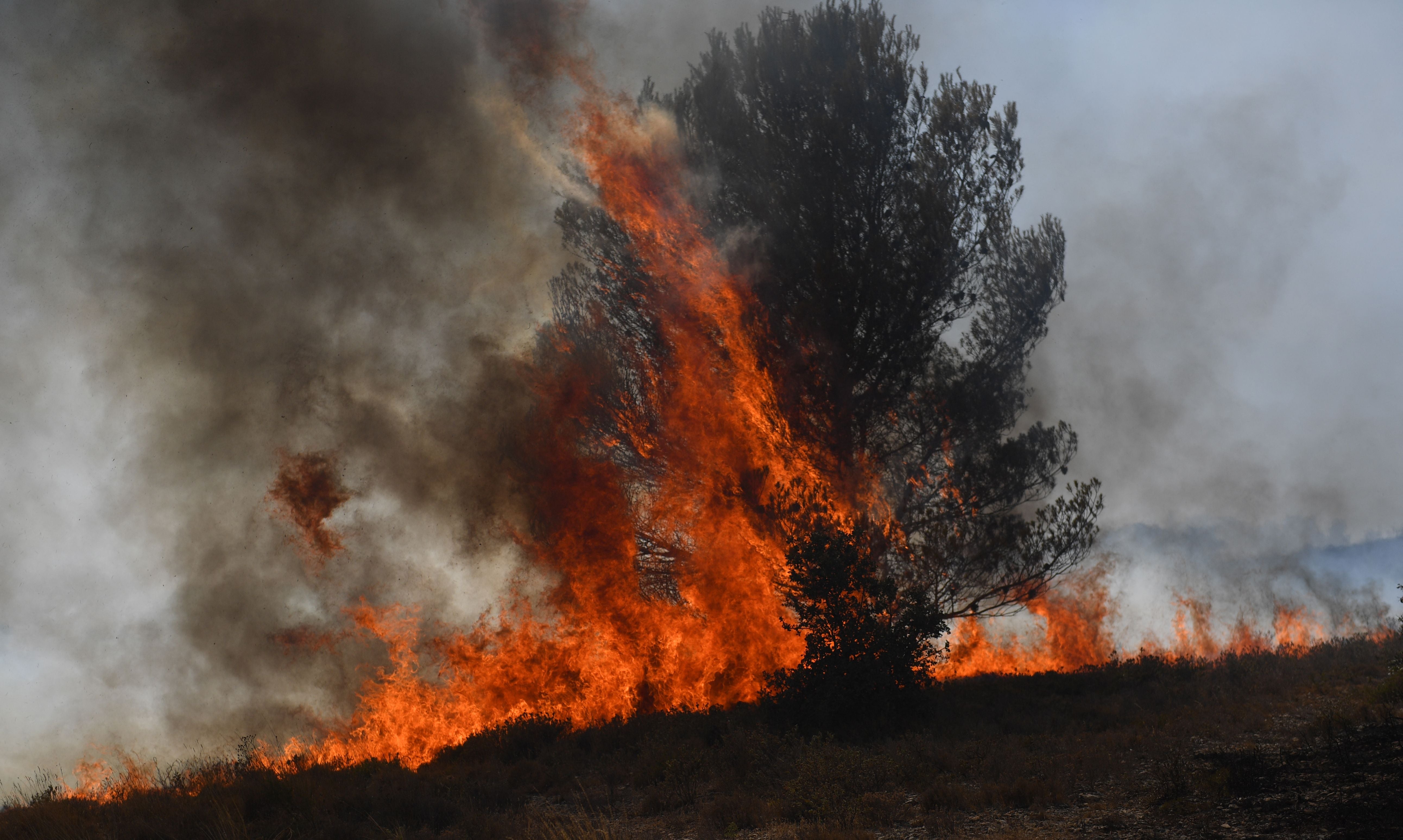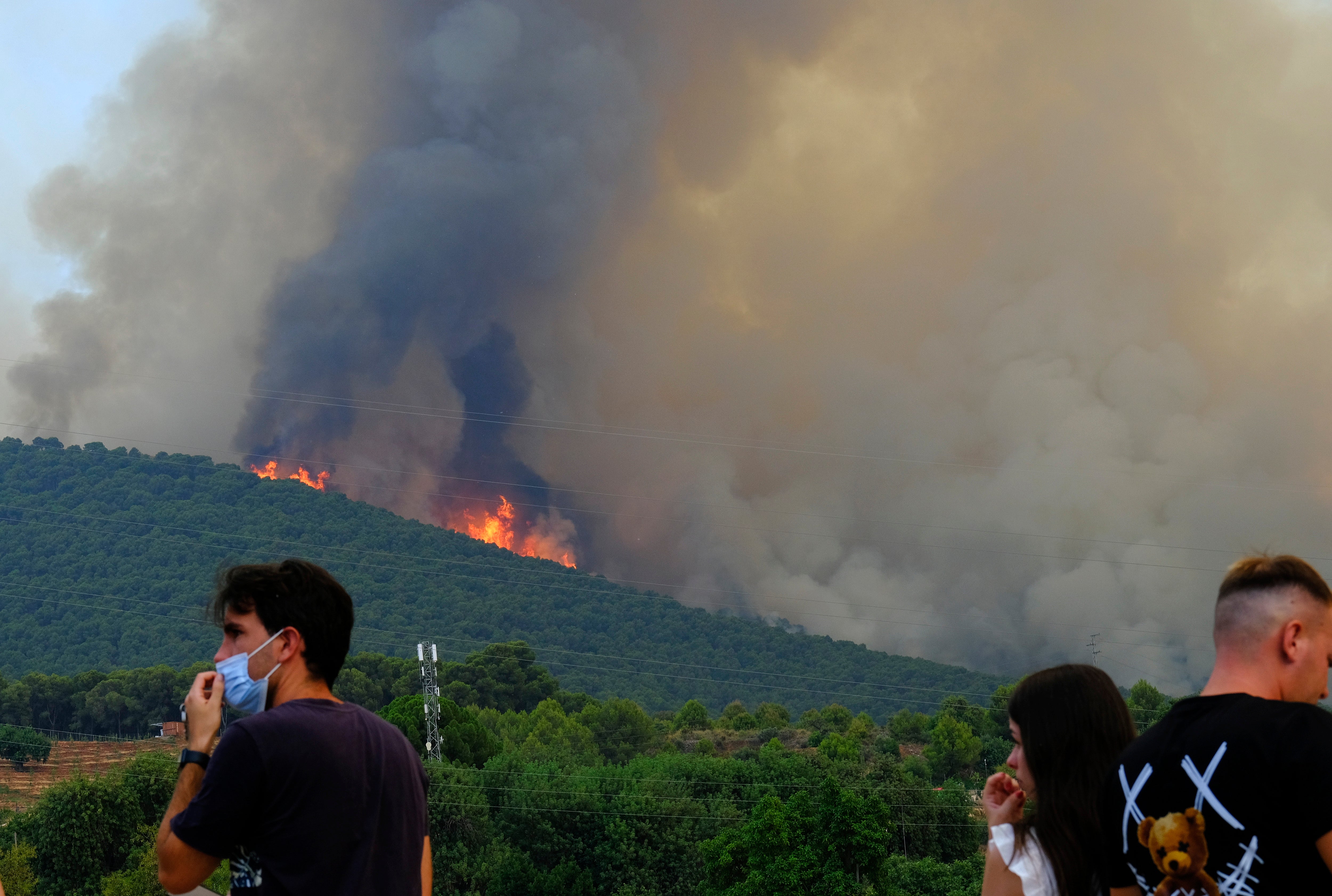‘Apocalypse of heat’: Europe battles soaring temperatures and raging wildfires
A train in Spain was stopped on the tracks as it was surrounded by fires

Firefighters continued to battle raging wildfires in France, Spain and Portugal as the heatwave brought blistering temperatures to countries across Europe.
The extreme weather, which has seen temperatures as high as 47C in Portugal, has sparked blazes that have forced thousands of people to evacuate their homes and businesses.
The fires have been concentrated in the Gironde in France and the Mediterranean areas elsewhere, however there were fears that the blazes were spreading northwards on Monday.
Much of Europe is baking in a heatwave that scientists say is consistent with climate change and has pushed temperatures into the mid-40s Celsius (over 110 Fahrenheit).
In France, more than 16,000 people have now been evacuated, as water-bombing planes and more than a thousand firefighters battle the spreading wildfires in the Gironde region.
The authorities are planning to evacuate more towns, with a further 3,500 people being at risk from the fires.
The Gironde regional government said “the situation remains very unfavourable” after gusting winds helped to fan more flare-ups overnight.

“The emergency services are prioritising protecting the population, preserving sensitive areas and limiting the progression of the fire,” French authorities said.
One forecaster, Francois Gourand of Meteo-France told AFP, that the country faced an “apocalypse of heat”.
It added that more than 200 reinforcements were being sent to support the 1,500-strong force of firefighters battling to contain the fires.
In Spain, fires have raged in the Mijas hills, near the tourist hotspot of Malaga, and there have also been outbreaks in the regions of Castilla y Leon, Galicia and Extremadura.
Overall, more than 30 blazes have broken out in the country after more than 10 days of temperatures over 40C.
“I left my country under fire, literally under fire,” Teresa Ribera, Spain’s minister for ecological transition, said as she attended talks on climate change in Berlin on Monday. She warned of “terrifying prospects still for the days to come”.

A train in the province of Zamora on Monday was stopped by encroaching wildfires. “It was really scary to see how quickly the fire spread. Just in the blink of an eye, a new bush began burning. It was a matter of seconds,” one of the passengers, Francisco Seoane, said. “It suddenly become night and we could even smell the smoke,” he said. Video of the unscheduled — and unnerving — stop shows about a dozen passengers in Seoane’s railcar becoming alarmed as they look out of the windows. Flames licked at the vegetation, and smoke darkened the blue skies as the train drew to a halt on Monday morning in the province of Zamora, where blazes have charred large areas of woodland in recent days. That province has recorded two deaths from wildfires in the past two days: a 69-year-old shepherd and a 62-year-old firefighter trapped in the flames. With no passenger announcements coming over the train‘s public address system, Seoane said passengers became agitated and began to stand up in the aisle. An Adif spokeswoman told The AP that passengers were never in danger. The country has also reported its second death in two days in relation to the wildfires. The body of a 69-year-old sheep farmer was found on Monday in the same hilly area where a 62-year-old firefighter died a day earlier when he was trapped by flames in the northwestern Zamora province.
Figures from Spain’s Carlos III Health Institute show that there were 237 deaths attributed to high temperatures from July 10-14. That was compared to 25 temperature-related deaths in the previous week.
The heatwave in Spain is forecast to ease on Tuesday, but the respite will be brief as temperatures are set to rise again on Wednesday, especially in the tinder-dry western region of Extremadura.
Spain was facing the eighth and last day of a more than week-long heatwave on Monday, which caused more than 510 heat-related deaths, according to estimates from the Carlos III Health Institute.
Almost the entire country currently faces an extreme fire risk.
In El Pont de Vilomara in Catalonia, evacuees gathered outside a civic centre, among them retiree Onofre Munoz, 69, who said that his home and van had been completely destroyed.
“We bought the van when I retired and now it’s totally scorched. We have nothing,” he said.
In Portugal, much cooler weather on Monday helped fire crews to make progress against the flames. More than 600 firefighters were attending four major fires in northern Portugal.
Hungary, Croatia and the Greek island of Crete have also reported wildfires this week.
Belgium and Germany were among the countries expecting the heatwave to hit them in coming days.

The EU said it was monitoring closely wildfires raging in southern member states on Monday, sending a firefighting plane to Slovenia over the weekend adding to recent deployments to France and Portugal.
Switzerland also suffered the effects of the heatwave. Axpo, the operator of the Beznau nuclear plant, said it on Monday it was forced to reduce output so that it does not overheat the Aare river from which it draws its cooling water.
The Swiss government issued a heat wave advisory, citing considerable danger across much of the country with temperatures in some parts reaching 36C (96.8F).
Meanwhile, the UK is on course for its hottest day on record on Monday, with temperatures forecast to hit 40C for the first time, forcing train companies to cancel services and schools to close early.






Join our commenting forum
Join thought-provoking conversations, follow other Independent readers and see their replies
Comments